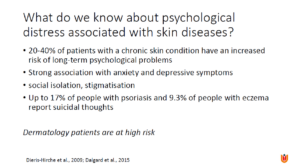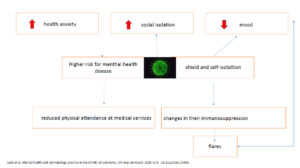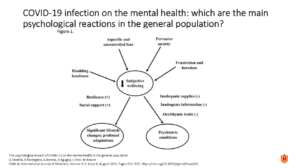During the Pandemic various online webinars were given about the Psycho-Social Impacts of COVID-19 on Patients with Chronic Skin Conditions. Generally they showed that:
Patients with chronic skin conditions (auto-immune disease related) using HQC have no higher risk of getting Covid. When using immune suppressants, patients should be more careful. When infected with Covid, consult your doctor whether to go on with the prescribed medication. People with autoimmune diseases of the skin do not have a greater risk of getting infected with Covid-19. There is no proof that Covid will have a worse effect on patients with autoimmune diseases of the skin.

In general anxiety and mood related complaints are the most common complaints of patients with skin conditions during the pandemic. When getting Covid, stigmatization and feeling rejected are also present.

About 20-40% of Chronic Skin patients experience a psycho-social impact of Covid-19.

Two webinars can be found at:
https://youtu.be/3bvWIwDAIHE (Impacts of Covid-19 on Autoimmune Diseases & Immune Suppressed Patients)
https://youtu.be/5FJQWqpJ2fs (The Psycho-Social Impacts of COVID-19 on Patients with Chronic Skin Conditions)
By Annemarie Sluijmers[/vc_column_text][/vc_column][/vc_row]



